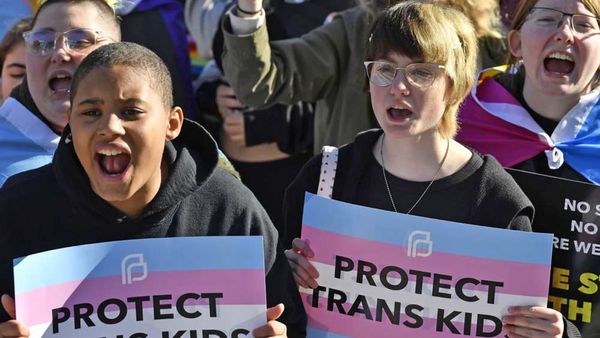
Feb 8
Ohio Backs Off Proposed Restrictions on Gender-Affirming Care for Adults
Geoff Mulvihill and Hannah Schoenbaum READ TIME: 2 MIN.
Ohio Gov. Mike DeWine's administration on Wednesday backed off its plans to impose rules that advocates feared would have restricted gender-affirming medical treatment for adults in a way no other state has.
The rules proposed by two state departments would have required the psychiatrists, endocrinologists and medial ethicists to have roles in creating gender-affirming care plans for clinics and hospitals. And patients under 21 would have been required to receive at least six months of counseling before starting hormone treatment or receiving gender-affirming surgery.
The Department of Health and Department of Mental Health and Addiction Services both issued revised proposals Wednesday after gathering public comment. Both said in memos that they were swayed by what they had learned as transgender people and care providers weighed in. The Health Department said it received 3,900 comments. In the new versions, the rules would apply only to the care of minors, not adults.
Over the last few years, 21 states have adopted laws banning at least some aspects of gender-affirming care for minors. Some are so new they haven't taken effect yet, and a ban in Arkansas was struck down in court. But so far, only Florida has restricted care for adults.
The departments said the rules will now advance to the next step of review before being implemented.
The draft rules would still require that patients under 18 receive at least six months of mental health counseling before they can receive gender-affirming medications or surgeries. The revisions made Wednesday also expand the list of mental health professionals qualified to provide the required counseling, adding clinical nurses, social workers, school psychologists and some physicians.
Further, a medical ethicist would no longer be required to have a role in developing facility-wide treatment plans for the care. In a memo, the Health Department said that change was made partly because institutions already use medical ethics professionals to develop policies.
In a statement, Siobhan Boyd-Nelson, co-interim executive director of the LGBTQ+ advocacy group Equality Ohio, said the changes "will be a massive relief to thousands of transgender people receiving care in Ohio who have spent the last few weeks scrambling to make contingency plans in case their care is cut off."
But she said major concerns remain about the remaining provisions and that it would have been better for the agencies to rescind the draft rules entirely.
Some parts of the rules regarding care for minors could have a muted effect. Last month, the Legislature banned gender-affirming surgeries and hormone therapies for minors by overriding DeWine's December veto of that measure, which would allow children already receiving treatment to continue.
That law will take effect in April.







